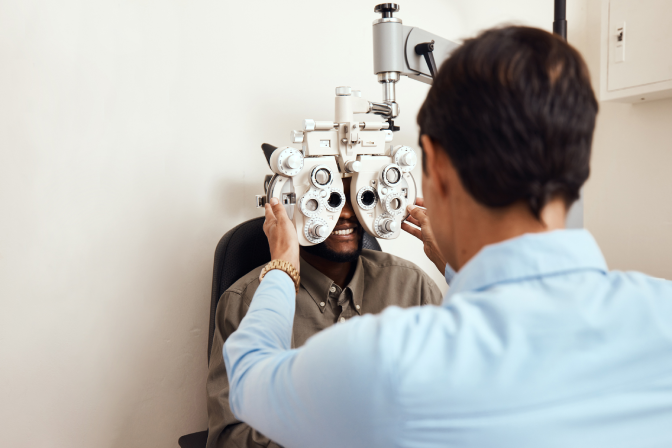Buy one pair of eyeglasses, get a second pair 50% off!
*Restrictions apply. Click here for details.
Emergency Eye Care in Kansas
Visit Us for Any Eye Emergency

The EyeDoctors Optometrists has a team of experienced eye doctors who use the latest technology to diagnose and treat ocular emergencies. Emergency eye care may be required for patients who are experiencing acute, painful, or debilitating eye conditions, including eye injuries. The EyeDoctors Optometrists in Kansas have the experience and skills to treat various eye care emergencies.
Find a Kansas Emergency Eye Care Doctor Near You

At The EyeDoctors Optometrists, our goal is to treat and give proper care to those in need of our service. Each Kansas office has the appropriate technology and experience to help diagnose, repair, and treat eye emergencies.
The EyeDoctors Optometrists has many locations throughout Kansas for emergency eye care needs. Find us in Topeka, Grand Junction, Ottawa, Emporia, and Lawrence. Discover which of our locations are closest to you.
What Is an Ocular Emergency?
An ocular emergency is defined as the sudden onset of symptoms or eye trauma that affects a person’s vision. Eye emergencies can be a few different things including trauma to the eye, sudden vision loss, or chemical exposure.
The doctors at The EyeDoctors Optometrists in Kansas can treat patients with a wide range of emergency eye care procedures and methods. If you experience pain, redness, or swelling in your eye, seek medical attention immediately to prevent further damage or vision loss.
Types of Eye Emergencies
The EyeDoctors Optometrists has a skilled and experienced staff that can diagnose and treat a variety of ocular emergencies. Eye emergencies can be any condition that causes pain, redness, or swelling in one or both eyes.
Bacterial & Viral Eye Infections
Certain eye infections like conjunctivitis can cause pain, redness, and swelling in the eyes and be accompanied by discharge Do not wear contact lenses and see a doctor as soon as possible if you think you have an eye infection. The EyeDoctors Optometrists can properly diagnose eye infections and prescribe you the proper treatment.
Chemical Exposure to Eyes
Chemicals in your eye can cause permanent damage and scarring to the eye. If you believe your eyes have been exposed to chemicals, immediately flush the eyes with a saline solution or tap water for at least 15 minutes.
Be sure to hold the head so that the injured eye is on the bottom and flush from the nose downward. Then seek emergency eye care as soon as possible.
Foreign Bodies in the Eye
Eye emergencies that involve foreign bodies in the eye can range from particles to large objects. The EyeDoctors Optometrists recommend trying to blink the object clear or flush it out if it is a small object. If it is a large object or has penetrated the eye, you should avoid touching, applying pressure, or attempting to remove it, These can all cause serious injury to the eye. You should seek immediate medical assistance as soon as possible.
What Are the Signs of an Eye Care Emergency?
Depending on the injury, the symptoms below may be presented:
Burning or stinging
Divergent or unusual eye movements
Double vision
Sudden, blurred vision
Flashes of light
New or increased sensitivity to light
Discharge or blood in the eyes,
Severe itching or swelling
If you have any symptoms of eye conditions or diseases, schedule an emergency eye appointment immediately.
Visit the EyeDoctors Optometrists If You Are Experiencing an Ocular Emergency

If you are experiencing an ocular emergency, seek medical attention immediately. The EyeDoctors Optometrists can help patients with eye conditions that can cause vision loss if left untreated.
If you are concerned about a change in your vision, call The EyeDoctors Optometrists to schedule an emergency eye care appointment.
Frequently Asked Questions about Emergency Eye Care
Medical insurance typically covers eye care emergencies including emergency eye disease care and specialized diagnostic testing. The EyeDoctors Optometrists recommends that patients prepare for potential eye emergencies by contacting their insurance providers in advance for important coverage details.
If you experience a sudden increase in eye floaters or spots in your vision, this may be an eye care emergency. Flashes and floaters can indicate retinal detachment or other serious health conditions.
Patients experiencing unusual or severe eye pain accompanied by fever, headache, light sensitivity, nausea, vomiting, or sudden vision changes should seek immediate medical care. Also, If there was a chemical exposure or foreign objects in the eye that cannot be cleared, and secretions of blood or other discharge from the eye should be treated as eye care emergencies.
